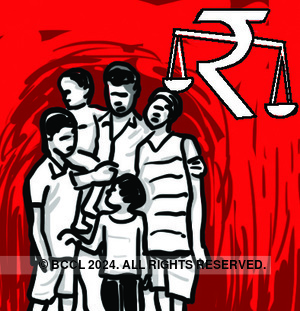Structural Inequality
It was the day after international women’s day (IWD). These women were shifting soil from a kilometer away to clean their small village. Because the nearby land owner would not allow them to touch their land! To fill up the water puddles and make the village more hygienic. They have been doing it for a few days, on IWD too.
Why were they doing it? They had lost all livelihood opportunities over the last two years. Men had come back from the various cities they were in, because of lock down. Men had returned back to their cities but not much money was coming in. They had to survive.
A well-meaning
civil society organization came up with this plan. Clean up your village
for 8 hours a day, Rs 300/- will be paid for those 8 hours. Cash for work, a
well-known program.
Listening to
their stories were disturbing. 4-5 generations back they had migrated from a
nearby district to this location. 5 or 6 families in the periphery of a jungle and beside a river, setting up their huts in an undeveloped area. Over time, these became their
village, and they lived out of jungle products and fish, barely surviving. A few decades
down the line, other communities started moving in. These were upper castes and
not lower castes like them. They had money and power. They offered minimal
money for the parts of land occupied by this community, and they had no other option but to give it off. Both out of economic necessity and power equations.
Over next few
decades, their community grew from six families and today they are 70 – 80 families.
But most of the land was taken away by the higher caste property owners, leaving
them with no land to cultivate, only to live together as 70 – 80 families in
crammed small area.
Livelihood became
a challenge, most men migrated in search of work, returning twice a year during
harvesting and planting seasons, to work in the property owners’ fields, which
actually their ancestors owned. As generations passed on these stories became a
past memory. Except one or two very seniors, rest do not have any knowledge of
these. They think that their fate is this. No land, to live crammed in
this small plot of land. They are lower than the property owners. They and
their future generations will always be the servants of the landowners.
Government systems had multiple programs to support them. But the decision was in the hands of one of the high castes who would decide who and how much will they get! One story from recent times - There was a cash for work program to clean up the canal. This was to be done by these families as a part of the government cash for work program. The property owner, who also had a JCB, got the signature and bank accounts details of all the families. Got the work done with his JCB and took 75% of the money for himself and gave them 25%. They had no other option than to agree. Their survival in the small plot of land as a community was linked to this. If they had said no, they would be thrown out of their land too, because the property owner was the head of the panchayat, and he controlled all decisions.
Not only the
land, but the roads to the town, is inaccessible. They have to
take the path through the jungle to reach the town. Because the property owners
do not want them to use even the public roads. When weddings happen in their
community, guests have to come through the fields walking since vehicles are
not allowed to come in.
In addition, there are the seasonal floods that flood out their village twice a year. They move in
boats to the other side of the river or move to the bund which is higher and
live there for 2-3 weeks till water comes down.
The children and
the youth of this community, want to some how get into some work as soon as
possible. To earn money, knowing that money will help them to have at least
food on their table each day. So, they drop out of school as early as possible
to join the workforce and move to cities away along with their fathers.
They had only one request - get us a road access! Rest is our fate, we will suffer.
Structures that perpetuate inequality, of which I am part of, knowing or unknowingly contributing to the structural inequality.





Comments
Post a Comment